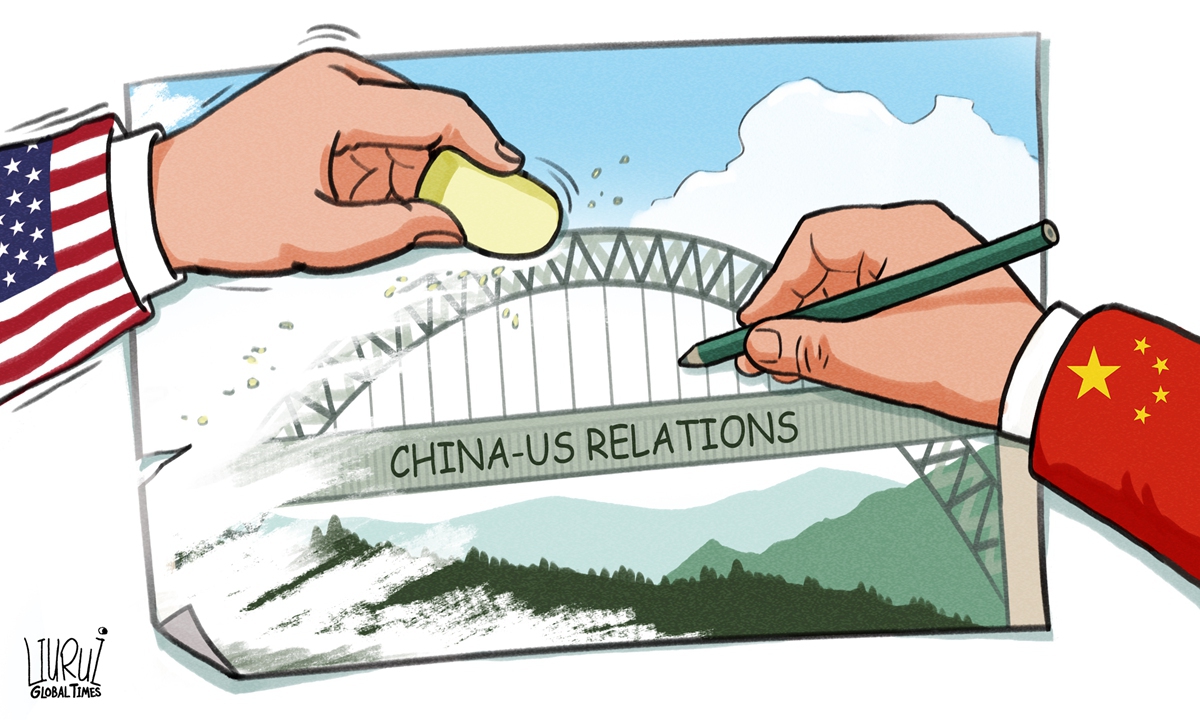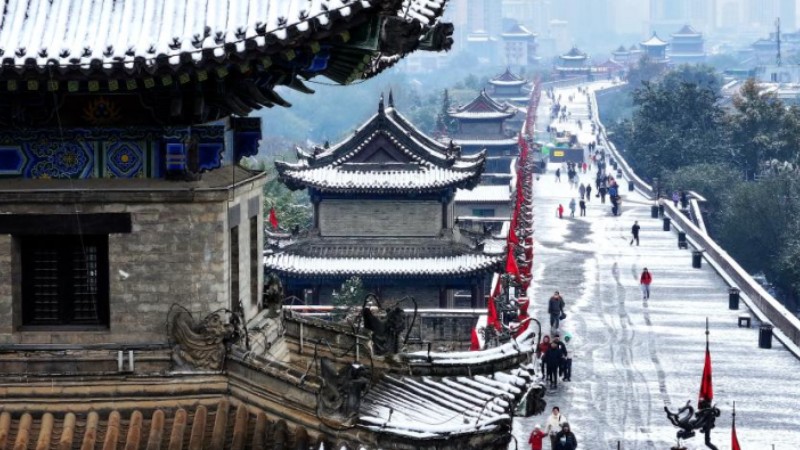US' domestic politics the biggest source of uncertainty for future China-US relations

Illustration: Liu Rui/GT
The direction of China-US relations has already been clarified in terms of efforts to ease, stabilize and restore the relationship. We hope it will stop falling and stabilize, not regressing or continuing to spiral downward. The China-US relationship continuing to stabilize is also the common expectation of the world.
Standing at this new point is the result of joint efforts from both sides. However, to restore the relationship and prevent further decline, both sides still have a lot of specific and detailed work to do. And they also need to handle many uncertain factors.
We believe that the future will be a critically important period to observe the decision-making, leadership and foresight of both China and the US. At this point, based on past experience and the reality of American politics, Washington faces the challenge of a more complex political environment and significant uncertainty.
Just one year ago, the leaders of China and the US reached in Bali, Indonesia a consensus on controlling the seemingly out-of-control bilateral relationship. However, since then, the US has not stopped its efforts to contain China, instead, it has intensified it, to the extent that China-US relations have once again reached a dangerous point of being out of control.
Doubts about the relationship being improved are mainly based on many facts that indicate that the incumbent US leader no longer possesses the leadership to integrate various interest groups in the US as he did in the past. Although he may have such a desire, the current political atmosphere and operating mechanisms in the US restrict his ability. He cannot escape the constraints of various parties, and whether his words can be trusted depends on whether he can obtain full support from the US Congress.
Due to the influence of partisan political struggles, Washington sometimes cannot do what it wants to and even has to compromise by exchanging interests, resulting in distortions and deformations of established policies, which is not uncommon.
The US is currently in a tense and delicate pre-election period, and both Republicans in Congress and candidates within the Democratic Party exert pressure on the China-related issues. They may continue to introduce measures to suppress and contain China. Government departments are still implementing policies that view China as the primary competitor. And it is still unclear where the brakes will be applied. These will pose difficulties for the Biden administration's proposed management of competition.
The two parties in the US are highly consistent in their policies toward China. Moreover, whether the policies come from public opinion or the Congress, it is now a different situation from the two major improvements in China-US relations, one is after the late 1970s and the other is after the 9/11 incident in 2001. The future of China-US relations can only move forward against such a volatile political climate.
Another uncertainty is next year's US election. If a new president takes office, will he continue the China policy established by Biden? Especially, if Donald J. Trump returns to the Oval Office, will these consensuses be overturned?
It may not be difficult for Washington to formulate and promote a policy that views China as a competitor, but it is very difficult to draw a line during the promotion process, to know where to stop and to boost cooperation based on such a broad goal. This is a task that requires precise judgment, coordination and leadership.
This is why, since Trump initiated the trade war against China, the US government has often said it will do so but the fact is it has done the opposite. It is simply a case of having insufficient capability despite the intention.
Recently, the well-known American scholar Joseph Nye coined a new term, "competitive coexistence," to describe China-US relations. We cannot help but admire the ability of American scholars to come up with new and innovative ideas, but this new concept cannot hide the contradictions and conflicts between competition and coexistence. When various competitive measures, like those currently taken by the US against China, are implemented, how can coexistence be achieved? Therefore, this statement itself suggests uncertainty.
Ultimately, all of these are related to American politics. If American domestic politics continues to operate in an uncertain form, the uncertainty of future China-US relations may become the norm. We have no other choice but to strive toward the best direction, but at the same time, we must also be prepared for potential crises.
Photos
Related Stories
- US businesses forge link with China on climate
- US student, teacher express affection for China
- China-U.S. cooperation contributes to rapid development of Port of Los Angeles
- To move China-U.S. relations on track of healthy, stable, sustainable development
- Summit charts clear course for China-US ties
- Interview: U.S. makes wise choice to collaborate with China, says expert
Copyright © 2023 People's Daily Online. All Rights Reserved.









